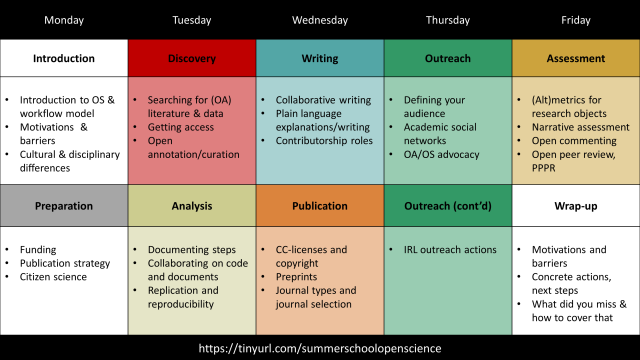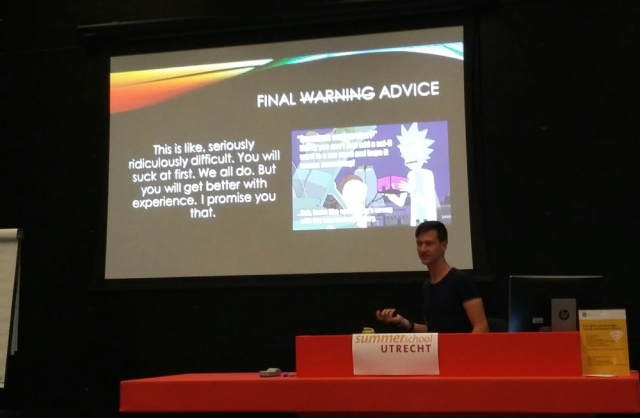by Bianca Kramer (@MsPhelps) and Jeroen Bosman (@jeroenbosman)
Open Science is the buzzword of the day. And for good reason, because under its umbrella people are working to make science and scholarship more inclusive, open, efficient and reproducible. To share and test our knowledge and ideas, Utrecht University Library offered a course on Open Science in August 2017 as part of the Utrecht University Summerschool.
Seven young researchers from around the world, and from a range of disciples attended a full week’s course in the middle of summer. We had turned the library’s Buchelius room into a cosy ’living’ (yes it can be done), with a continuous supply of stroopwafels.
The idea behind the course was for the participants to gain insight in the why and how of an array of open science practices and ideally also start applying that knowledge to their research projects.
Apart from a very important introductory session (to get to know each other and create and agree on a code of conduct) and a wrap-up session, the programme (see Fig. 1) consisted of 8 half day sessions, for each of the phases of the research workflow (one phase got a full day). Despite having a full week, it was still difficult to decide what to include.

Fig. 1 The main programme schedule showing the half day sessions
One of the premises was that participants should be allowed to be ‘selfish’ and spend their time in such a way to get the most out of the course for themselves. To make that possible we limited plenary presentations to 1 hour per session and let it up to the participants to work on one or more assignments of their choosing for the remainder of each session. Despite this approach it was good to see many lively discussions and group work.
The full programme with links to all presentations, assignments and supporting material was and still is publicly available with a CC-BY license. To bring in extra expertise and have a variety of opinions and approaches we invited five co-lecturers: Chris Hartgerink, Stephanie Paalvast, Tessa Pronk, Jon Tennant and Rolf Zwaan.

Jon Tennant, one of the co-lecturers, in action
A special and very well received element in the course was the afternoon dedicated to outreach and advocacy. Participants had very stimulating talks way Open Science is practised in Utrecht with Frank Miedema (University Medical Centre Utrecht), Sanli Faez (Science Faculty) and Maud Radstake (Studium Generale).
The course as a whole was well received (all participants filled out the evaluation form) with an average score of 8 out of 10. Everyone indicated that they learnt things that were relevant and applicable in their own research. Suggestions for a next edition were a.o. to look at the price (or offer reductions) and to make it even more personalised.
In all it was an intensive and very enriching experience. A lot of course materials were developed and are now available for reuse (and improvement). Ideas and materials are also very valuable for our own university as it plans to stimulate and support open science practices across the board.
